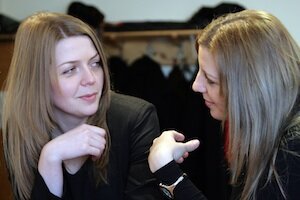I want to put my best foot forward, but I only have two feet with the same mind. Can’t move forward, can’t go back, can’t stop what’s going to happen and cannot change what already has happened. And my past actions have made huge holes in my life, and my thoughts and emotions have minds of their own and take control, leaving me with a vague feeling that something happened, I did or said something and I cannot put my finger on the insanity that is driving my life.
Communication Archive
- Sub-Categories
- No categories
Art with Mental Health Detritus
I enjoy using pill bottles and Saphis casings as frames for my mixed media oil paintings. Stockpiling and creating from the detritus of my illness makes me feel as if I am doing something positive and healing. In so openly declaring my illness in visual art, owning it, I feel I am working towards destigmatization. These three paintings were created in the same series of recent work.
Persistent Past in a Present Future

My therapist has a thing for drawing me charts that she hopes I bring home and post on my wall (I do). It ends up straining both my eyes and my mind. We tend to get into complicated conversations that involve chaos theory and the nature of humans. My most recent chart (a flow chart of such) describes how the past connects us to depression, the future to anxiety, and the present to calm and balance. But I have questions. As I usually do.
Naming Names – Putting Agoraphobia Into Words

I still don’t know how to talk about agoraphobia. I’ve been trying to figure out how to explain it to people since I was 16 years old, but I’ve been largely unsuccessful at putting it into words. I’ve mostly just stayed quiet about it and used vague “anxiety” euphemisms to describe why I can’t hang out / go to work / go to class / go grocery shopping / whatever, and have also spent a lot of time struggling to come up with “legitimate” ways to account for what I do with my time while NOT doing these things, especially since spending [lots of] time alone or in my “safe zones” is actually super positive for me. For almost 20 years, I’ve had no concept of how to talk about this enormous part of me that has both limited me in humongous ways and also shaped me into the wonderful weirdo that the people close to me know and love.
DBT Skills: Interpersonal Effectiveness

I have to admit that social interaction and communication are not my strongest points. This is a relatively new development for me, or so I thought. I used to think I was great at using my voice, at standing up for myself, at being in social situations. Today there are a number of barriers that prevent me from being effective in interpersonal communication. One of them is mental and emotional health issues. It’s really hard for me to connect with others when I don’t feel so great myself. Another is acute hearing loss, in both ears, coupled with tinnitus. And finally – and probably the most overwhelming for me, especially when it comes to asking for what I need and speaking up for myself, or saying no when being asked for something – I was raised in an environment that didn’t really encourage me to use my voice under any circumstances. In fact, it was preferred if I was invisible, or at least that’s how I translated it.
Pro-Anorexia Websites and Recovery

In a recent article in Time magazine, Maia Szalavitz suggests that “Pro-Ana” blogs and websites can actually help some anorexics. On the periphery of Szalavitz’s argument, I can agree with much that she says, however when it gets to the core, I have to disagree with the fundamental principles of what she is suggesting.
My Experience With Alcoholics Anonymous And Early Sobriety (Ava)

Sobriety is a different forest, and one I am picking my way through carefully. The level of commitment that AA seems to require is daunting, as is the god issue. But I have seen people speak there that moved and affected me in a way that was more beneficial than any serenity prayer. Balancing cynicism and nihilism with the all-to-clear possibility of death, I’ve relapsed this month but I’m trying to embrace the program without losing myself. When I relapsed, my wife yelled at me to give her the rest of the bottle of vodka, and all I could say was, “I want something to myself, that is mine.” I gave her the bottle. I want to believe I have other things to hold onto, but the glacial heft of a glass bottle is a hand held.
Codependant Relationships: What They Are and What You Can Do If You Find Yourself In One

Previously in time, codependent relationships were typically described as a relationship involving one person with a substance abuse problem with a sober (or generally non-addicted) partner. The idea of a codependent relationship regarding substance abuse is that the sober one continuously tries to help the person with the addiction. Seeing as how an addicted person struggles with their own issues and their focus is primarily on feeding the addiction, often all the work in the relationship to keep it functioning lands on the non-addicted partner. The substance abuse becomes the main focus of the relationship and the non-addicted person allows everything to revolve around their partner’s problem, often ignoring their own needs in the process.
Ramifications of Queer and Mental Illness Visibility

While part of my identity is “Out of the Closet”, as the thrift stores I frequent so gaily proclaim, the mental health side of my identity is still partially in the closet, a monster in the closet that emerges and slides back in as I hide blog posts, switch back and forth my internet expressions, erase tweets, and deep down know that the internet knows everything forever. Spokeo owns me and it owns you.
How to be an Ally to Disabled & Neurodiverse Folks in Activist & Academic Communities

This is based on my own experience as a Disabled, Trans, Queer, Autistic activist. In compiling this list, I consulted other Disabled activists as well. Most activism I’ve been involved with has taken place in Queer, Radical, & Academic communities. I’ve been both a grass-roots activist and a student activist. I do not claim to speak on behalf of Neurodiverse or Disabled folks–or any group for that matter. Here are a few ideas I’ve compiled on how to be a better Ally to folks who have been left out of social and political movements/communities:
- 1
- 2

